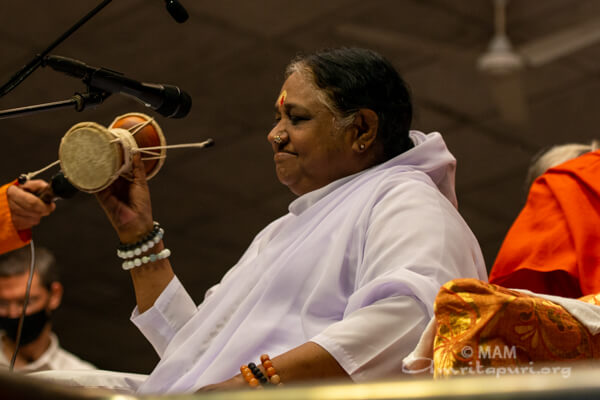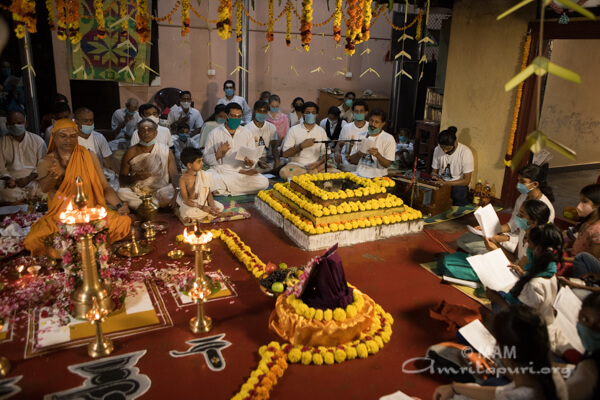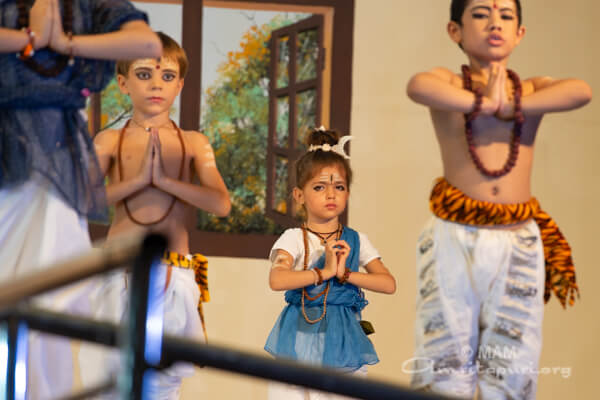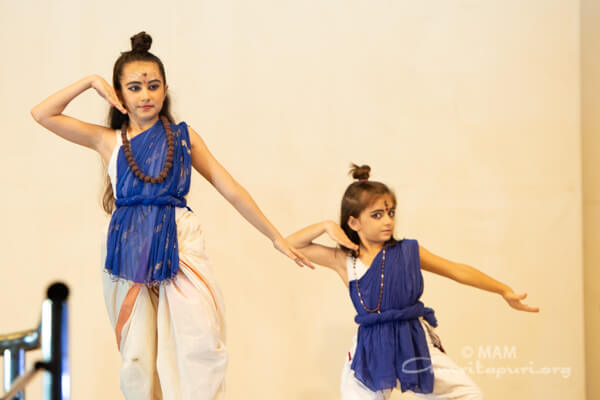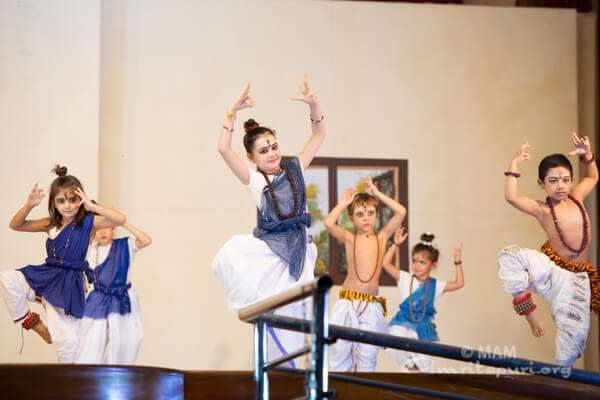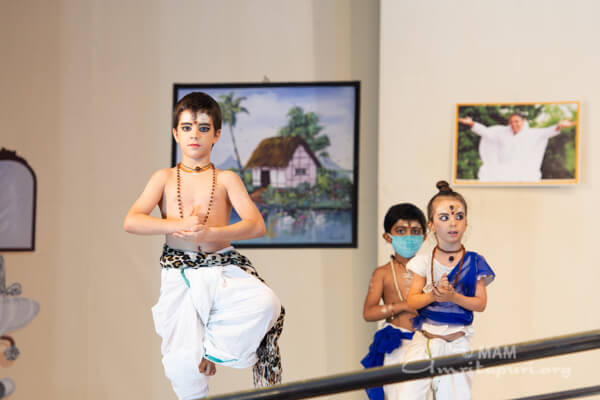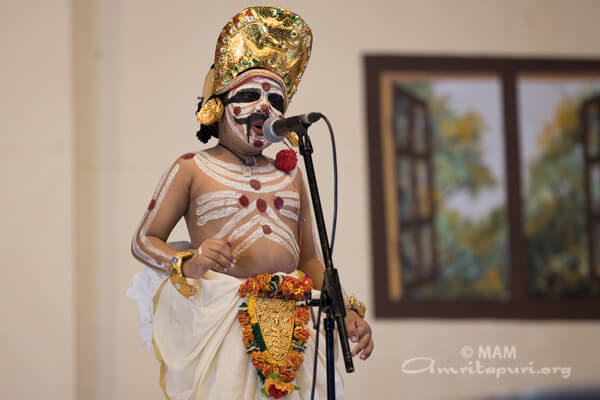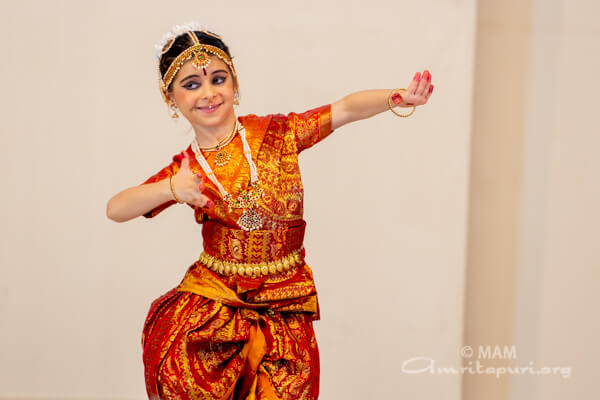11 March, 2021 – Shivaratri celebrations, Amritpuri
Excerpts from Amma’s message on Shivaratri
Sivaratri is the night that gives us supreme auspiciousness. Sivaratri is a celebration that combines spiritual austerities, renunciation, fasting, devotion and knowledge. By worshipping Lord Siva through all of these, we attain supreme auspiciousness. This means becoming one with God.
Lord Siva is known as “the destroyer” or the god of final dissolution. If something has a beginning, it must have an end. And if there is a beginning there is an end, definitely there will be preservation in the middle. Creation, preservation and dissolution can never exist independently. For the flower to bloom, the bud must die. For the fruit to form, the flower has to fall away. Hence creation, preservation and dissolution are but three aspects of the same thing. In the same way, Brahma, Viṣṇu and Mahesvara are but three different faces of the one Paramatma.
The wondrous leelas and stories of Lord Siva’s greatness are endless. He is deeply absorbed in meditation; at the same time, he is also Naṭarāja—the Cosmic Dancer. He is the wandering monk in solitude who begs for alms; at the same time, he is the father of the entire universe, as well as Ardhanarisvara—the composite form of male and female split down the middle. He is Bhairava, who ferociously punishes the unrighteous. As Daksinamurti, he was the first guru to the ṛṣis and to the world. As Nilakaṇṭha—the blue-throated one—he became the saviour of the world. He possesses the third eye—the eye of supreme knowledge. He has conquered Kala and Kama—time and desire. In this way, the names of Siva are endless and infinite. Each divine form and divine mood he assumes is laden with meaning, teaching us many spiritual truths.
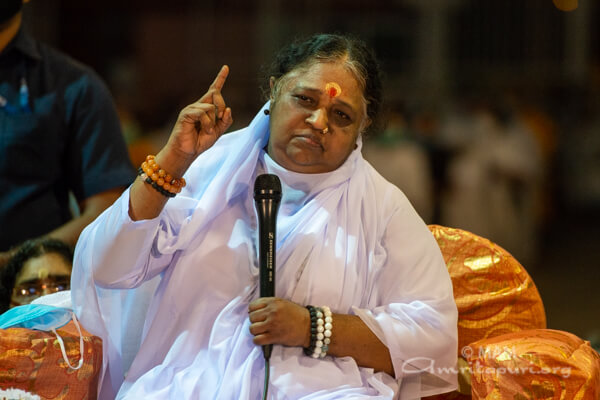
It is possible to have many kinds of good fortune in life. For example, one may be born into a noble family, have loving parents, have physical beauty and good health, be highly educated, have wealth, fame and status, etc. However, all such good fortunes are impermanent; they all fall under the category of “here today, gone tomorrow.” They are all dependant on the material world and its objects. They can all disappear any instant. Hence, the most auspicious thing is that which bestows permanent happiness and contentment that can never be lost. And that is the bliss of the Atma [Self], of oneness with God. Sivaratri leads us to that bliss.
The main observance during Sivaratri is to worship Lord Siva, forgoing food and sleep. Sivaratri is the night where, having conquered the sense-urges of hunger and thirst, we safeguard ourselves from slipping into the sleep of ignorance and stay in the wakefulness of true knowledge. While the world seeks rest and pleasure in the night, the devotee’s attitude is different. Night is the perfect time for God-remembrance. Sensory enjoyments give only brief and limited happiness. This is not to say that we should never partake of them. But when we enjoy them, let us also have gratitude for the grace of God that made them possible.
The limited enjoyment given by the world satisfies most people. But there is higher happiness and peace that come when the senses and the mind are under our control. Fasting and other spiritual austerities are like keys to unlock the door to that.
Fasting is one of the primary observances of Sivaratri. It is traditional to observe a complete fast for an entire day and night. But it is also fine to fast according to one’s capacity. The word upavāsa [fasting] actually means to “stay near” God; in other words, to remain established within the Self. Forgoing food makes this easier.
In fact, everything we grasp with the five senses can be considered a form of food. Forgoing edibles represents giving up all sense objects. When we do not eat for a day, our digestive system also gets a break. During this time, our body uses the energy conserved by not having to engage in digestion to cleanse itself of toxins and disease. Our praṇa [life-force] regains its flow in the proper direction, and the mind more readily attains a meditative state. If we forgo sleep in this way during the night, we will remain wakeful. Moreover, our meditation will also become one-pointed.
Many physical ailments can be cured with fasting. However, fasting should not be done excessively. Balance and moderation are essential. The Bhagavad Gita cautions us that yoga can be practised by neither those who sleep too much nor by those who sleep too little. Our blood pressure increases if we sleep too much and also if we sleep too little. Yoga is impossible for both the one who starves himself as well as the glutton. Many people experience the problem of the mind sliding into sleep when they try to make it one-pointed. If we have too much tamas [dullness], this will definitely happen. Many people successfully use recordings of satsaṅgs or chanting mantras to help them fall asleep, in lieu of sleeping pills.
Sivarātri is a day for God-remembrance. It is difficult for the mind to continuously focus on one thing with full awareness. One needs to have an intense love for the object of focus. This is also what happens during meditation. Some habitual thoughts enter the mind. Eventually, meditation and sleep—or meditation and distracting thoughts—become bosom buddies. Since the mind wanders after that to which it is attached and to that with which it is angry, when we close our eyes to meditate, the mind goes to all those places. What is the solution? We have to develop alertness over and over again until we gradually transcend it.
Most people observe Sivaratri fasting and nightlong vigil without understanding their real intent. Staying awake by watching movies or playing games on your cell phone will not make it a Sivaratri observance. We should understand the principle behind the Sivaratri observances.
The Astamurti—the eight manifestations of Lord Siva—are well known. They are space, wind, fire, water, earth, the mind, intellect and the individual soul. The principle behind the iconography is that the entire universe is pervaded by Siva. Hence it is our dharma to see God in every aspect of creation and to love, serve, respect and revere them. It is to this perspective that we should raise ourselves through the worship of Lord Siva. Sivaratri exhorts us to wake up from the delusional sleep of ignorance and find the peace and beauty within ourselves. May each one of us awaken into that state of wakefulness. May grace bless my children.
There were some cultural programs by the ashram kids in the presence of Amma. Throughout the night bhajans were there. Special poojas also were conducted at Kalari too in connection with Shivaratri.

